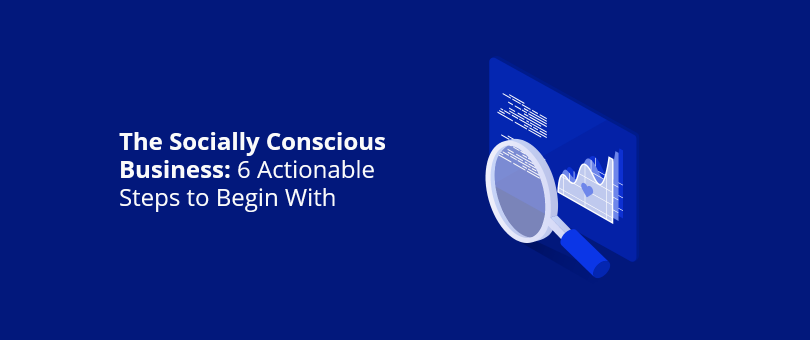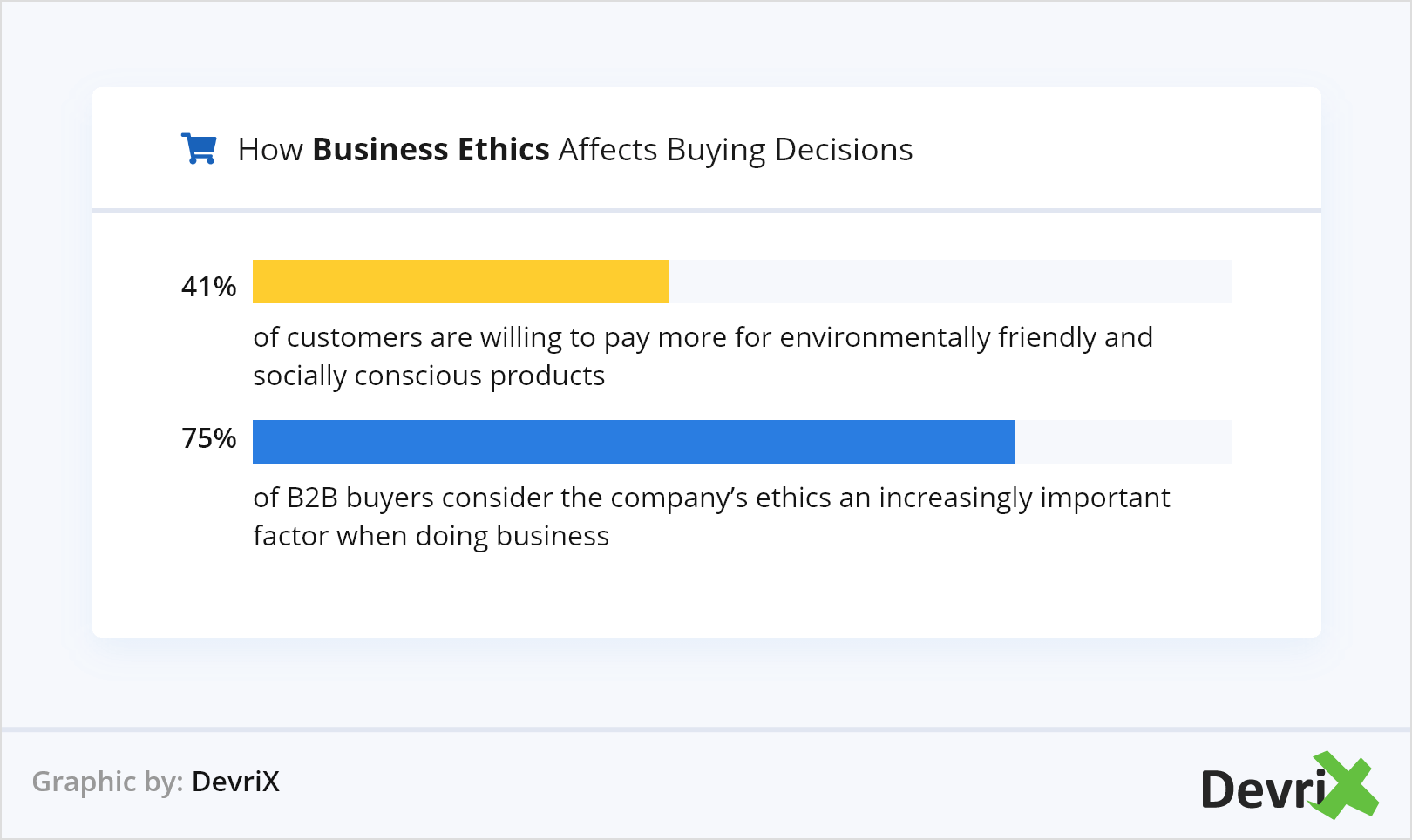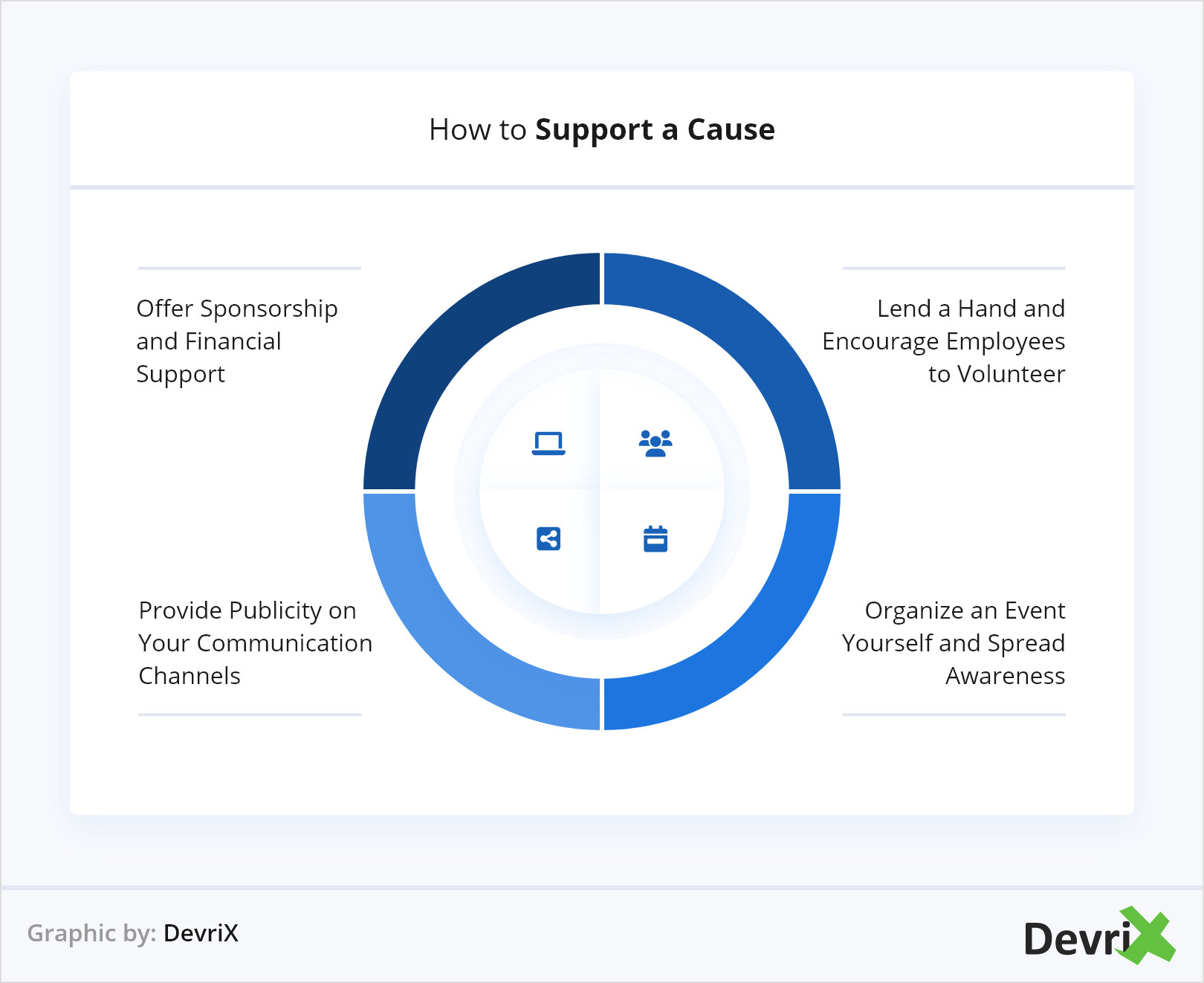Making your operation more conscientious and sustainable is about changing your overall perception of a successful business.
Nowadays, what B2B and B2C customers are looking for goes beyond the quality of the product and the image of the company. They want to support ethical brands – corporations and small businesses – that share the same values as they do, show social and environmental responsibility, and are genuinely righteous. And when faced with a choice, they will always go for the socially conscious brands that provide what they need without sacrificing the greater good.
Simply put, a business can’t be only about gaining profits at any cost, not anymore.
A socially conscious business can be described as a company that has a higher purpose, cares for all relevant stakeholders and not only for shareholders, and is run by a conscientious leader who understands that money shouldn’t be the ultimate conscious business value. The responsibility principles of the company are valid from top to bottom of the hierarchy and are accounted for in every business decision.
For a company to be identified as conscious, the greater good should be at the core of its values and business culture, not simply an addition to it.
People feel that brands should take a stance and care for the environment and the community, and should act swiftly to make a difference. Shifting your business model to a more socially conscious one will show your clients that you are ready to move with the times, and act on social values, which will increase trust in your company.
In this article, we suggest 6 actionable steps that can bring you closer to your customer, to your community, and to sustainability.
1. Don’t Worry About Losing Profits
A conscious business is not a non-profit organization. Revenue, profits, and growing your operation are still what your day-to-day is about. However, the difference is that you should be mindful about the way you climb to success and care about how your actions affect the world around you. What’s more, running a socially conscious business, if done right, can even improve your profits.
41% of customers say they are willing to pay more for environmentally friendly products, and if you are the one who delivers what they need, they may even switch from a competitor to you, simply because you share the same values.
The same goes for B2B connections. Businesses that are socially conscious want to associate themselves with others that are led by the same principles. 75% of B2B buyers consider the company’s ethics and increasingly important factor when deciding whether to start a new partnership. And yet, almost half of people (41%) doubt that companies act with society’s interest in mind.
Standing behind what you believe in and running a responsible business not only gives you the moral high ground but can help you grow your network of customers and boost your profits. It’s a win-win.
2. Make Your Product Environmentally Friendly
The carbon footprint of companies is becoming more and more important to customers, and it should be equally important to businesses as well. We all have an impact on the environment and share the responsibility, but we also have the power to make a difference.
88% of people think that it is extremely or very important that companies implement environmentally friendly initiatives and take action. And changing your product is the best statement you can make.

Source: Patagonia.com
Well, yes, not every company can be like Patagonia, but taking small steps in the right direction is better than standing in one place. And once you start your journey, you’ll find it easier with each next achievement.
Moreover, businesses are in a position that allows them not only to influence others but to make an impact at scale.
For example, if your products come in plastic packaging, all your customers can do to make a change is recycle or switch to a competitor who offers a more sustainable alternative. But if you reconsider the materials you are using and the production process, you can keep your customers around, win their respect and loyalty, and, more importantly, make an environmentally conscious choice that inspires others.
And if you are worried that this will increase your costs and the price of your product, fret not. As mentioned, when you share the same values with your customers, they will support you and will be willing to pay extra, knowing that their money funds a good cause.
3. Support Causes Your Audience Cares About
Companies should support causes that correspond to their values and principles. And while it is good to focus on what’s important to you, you should also consider what your target audience cares about. This way you can both inspire them to be more aware of issues that you want to make a stance about, and support social or environmental initiatives that they follow.
Ideally, it should be things that are important to you as well, and maybe even have relevance to your products and services.
What matters is that you should support causes that you understand and can relate to. Avoid just throwing around money and marketing slogans to gain publicity without actually caring or making the issue integral to your values. By doing this, you may achieve the opposite effect and drive your customers away.
So when joining a cause, make sure your heart is in the right place, and show consistency in your personal and business actions. Your goal here is to do what good is in your power and pass the kindness on.
- Offer Sponsorship. Some initiatives have enough followers in their ranks but lack the funds to act on their ideas. Financially supporting a cause can be a good start towards making your business more conscious. However, consider finding other ways to become involved and always ask if there is anything else you can do to help. Otherwise, it may seem that you are joining in only for publicity.
- Spread Awareness. Speaking of publicity, the communication channels that you use in your marketing – digital or not – are a great way to spread the word about causes that you care about. You can provide information, announce events, and share updates. This way you spread awareness, but at the same time, publically give your support and show customers your values, inviting them to follow.
- Lend a Hand. If there are already activities in place that support the cause, you can join them by volunteering and offering to help out in the organization, and implementation. You can encourage your employees to participate on company time, and depending on their skills, to help out with professional expertise or simply with some heavy lifting and whatever else is needed.
- Organize an Event Yourself. You can use your public position to raise awareness about causes that you care about and support the local community. It can be by organizing fundraisers, planting trees and flowers, gathering volunteers to clean up a neglected recreational area, cooking for people in need, or whatever else you care about. What’s important is that you take a stance and do a good deed without expecting anything in return.
4. Reduce or Neutralize Your Carbon Footprint
In spite of making your product environmentally friendly, there are a number of activities you can undertake to reduce your carbon footprint and change your company for the better.
Sustainability is not only about grand gestures. It’s about the little changes we do in our everyday life that make a difference. It’s about people.
And having in mind that your employees spend most of their time in the office or at work, building a conscious work culture will positively affect both them and the environment. If your coworkers are already into sustainability, they will feel more at home at work and will be more loyal and involved in your goals and values. And if they are not familiar with the concept yet, you can set an example and influence their actions.
This way you will not only reduce the carbon footprint of your company as an entity but will help people do the same as individuals.

- Plant Trees and Other Greenery. Trees are great, and you can organize your employees to do tree planting in a local park, a deforested outdoor area, or wherever you see fit. Also, building a balcony or rooftop garden at the office is a great way to help the bees and create a pleasant leisure spot at the same time.
- Use Hybrid Cars. Hybrid or electric cars are the future, and if you are using company vehicles, switching to an eco-friendly alternative will reduce green gas emissions. Even if you are running a small operation, driving a hybrid yourself, or why not even a bicycle, will set a good example.
- Work with Local Suppliers and Local Talent. Sticking to local will not only reduce your footprint but is also a way to support your community. Even if you are a strictly digital business, and don’t run deliveries or manufacture, you still need office supplies and other necessities, and local ones can be more sustainable for you and the environment. Furthermore, providing jobs, internships, and professional skill upgrades is also a great way to give back to the community and make a difference.
- Don’t Waste Resources. People are used to wasting stuff without even thinking about it. But big changes start small. The least you can do is not print out documents, unless absolutely necessary. You can also work with a power and electricity expert to evaluate what kind of lightning will be most efficient in your work environment. This will reduce your bill and will make you more eco-friendly. Also, the average American office worker uses 500 disposable coffee cups a year, and those are not even recyclable.
- Reduce Single-Use Plastic. Some parts of the world already support or are working on it, a single-use plastic ban, but before the legislation is embraced worldwide, the problem will remain out of control. You can do your part and make your office plastic-free. Consider encouraging employees to reduce single-use water bottles and utensils, by providing reusable branded ones or other alternatives.
- Recycle What Cannot Be Reused. We already know that recycling is not enough to solve environmental issues anymore, but it is still better than leaving stuff to end up in landfills. Encouraging a reduce-reuse-recycle culture in your office can be the first and easiest step you take towards a sustainable workplace.
5. Treat Your Employees Fairly
Being a socially conscious company is not only about showing off to the customers. It’s about your values and how you run your business, and this includes your employees as well.
Inclusivity and diversity should be part of your company culture and not just slogans to wave around as PR assets. This means that people should feel safe in their work environment, cared for, respected, and, of course, paid accordingly. And if any situations occur that threaten this, they should be addressed and dealt with in the most respectful way possible.
Your workmates are your greatest asset and if they are treated fairly, this will show in the way they do their work, boost their productivity, improve customer service quality, and will, ultimately, reflect on the product and sales.
Also, happy employees are the best brand advocates. If they believe in what you are doing and you share the same values, they can create the most influential word of mouth and positively affect your reputation.
6. Encourage Volunteering

Volunteering is a great way to give back to the community. Many people have made it a part of their everyday lives to support causes they care about and help out whenever they can. But as your workmates are busy doing their job and have to balance their personal and work life, it may become difficult to find time for volunteering. Also, activities they can join in on don’t only have to happen on the weekend.
You can encourage your employees to volunteer by giving them a day off when they can offer their service where needed.
What’s more, you can even show interest in their causes, join in, and help where you can. This will not only make you closer to your employees and strengthen your connection but will allow you to understand your local community and what they care about.
Also, volunteering gives you a rewarding feeling that can lift the spirits of your team, help them acquire new skills, and give them the sense that they are being of service to others.
Bottom Line
Nowadays customers hold companies accountable for their deeds, the way they treat people and the environment, and what values they stand behind.
Whether it is out of trendspotting, or because they really care, people are becoming more aware of the long-term price of consumerism. And while they still cherish their comfort and want to afford things that give them joy, they prefer to make the purchase with an easy mind, and know that it won’t harm the environment.
Big changes don’t happen overnight, but by taking small steps in the right direction, and truly believing in what you do, you can have a socially conscious business sooner than expected.



![Influencer Marketing Statistics Every Business Should Know [Infographic]](https://devrix.com/wp-content/uploads/2019/10/Influencer-Marketing-Statistics-Every-Business-Should-Know-Infographic@2x-380x160.png)


